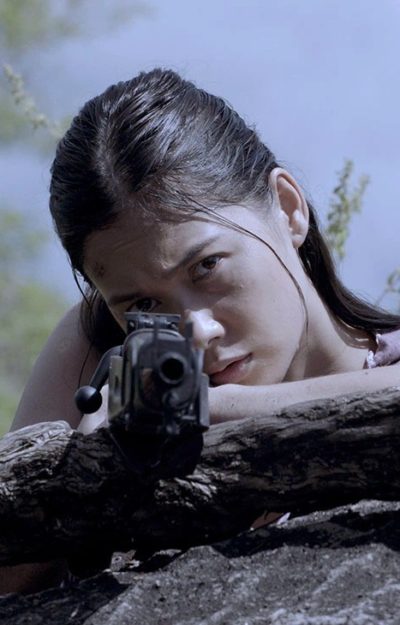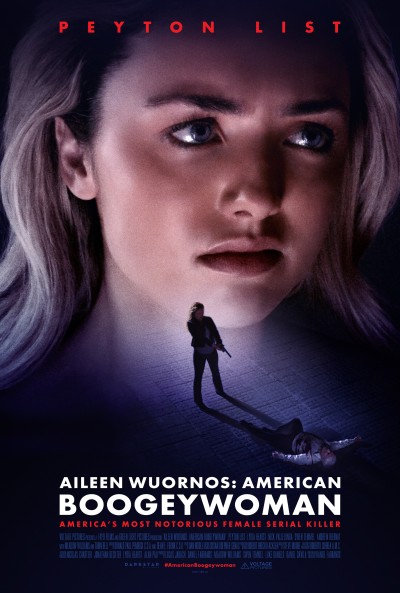★★★
“There will be Blood“
 This is part of the Blood universe, which previously gave us anime series Blood +: Episodes 1-25 and Blood: The Last Vampire in both animated and live-action versions. That’s small beer compared to the Blood-C segment, which began as a 12-episode anime show, subsequently becoming two manga series, a novelization, a stage play, and three live-action movies. The other two, set in the current day and entitled Blood Club Dolls 1+2, aren’t of interest here despite their title (and aren’t very good), since at least the first only includes a brief cameo by Saya, the heroine of the series. Her role here is considerably more substantial, and it’s basically a better production all round. Not least because most of it works reasonably well with no prior knowledge.
This is part of the Blood universe, which previously gave us anime series Blood +: Episodes 1-25 and Blood: The Last Vampire in both animated and live-action versions. That’s small beer compared to the Blood-C segment, which began as a 12-episode anime show, subsequently becoming two manga series, a novelization, a stage play, and three live-action movies. The other two, set in the current day and entitled Blood Club Dolls 1+2, aren’t of interest here despite their title (and aren’t very good), since at least the first only includes a brief cameo by Saya, the heroine of the series. Her role here is considerably more substantial, and it’s basically a better production all round. Not least because most of it works reasonably well with no prior knowledge.
It takes place not long before the outbreak of World War II, in a small rural village, plagued by a series of mysterious deaths. Brutal military policeman Amakatsu (Furuta) is charged with investigating, blaming local communist sympathizers. However, two elements suggest otherwise. Firstly, the arrival of Saya Kisaragi, member of a vampiric race called the ‘Elder Bairns’, who hunts her own kind. Then there is the contraction of a mysterious blood-based disease of Ran (Aono), the sister to village resident Ren (Matsumara). He encounters Saya when she meets a police squad, and tries to rescue her. If you’ve seen any of the entries linked above, you’ll know that she isn’t a character exactly in need of rescuing.
Wisely, the film doesn’t stretch out the “who” aspect of the mystery, since it’s not exactly hard to guess. The “why” does turn out to be a bit more unexpected, and at the end, there are a few moments where it does feel like some familiarity with the world in which it works would be helpful. Generally though, it’s fine as a standalone piece. I would have liked to have seen more of Sana in action: after taking on the police, she takes a back seat to Ran and the struggles of the village to convince Amakatsu they’re not better off dead than red. However, it certainly qualifies for the site, with some solid sword-fights at the end, which make up for in very enthusiastic, crunchy sound design, what they may lack in explicit gore and impalement.
Outside of Sana, it is a bit bland in terms of characters. Ran doesn’t make much of an impression and, until the final third, neither does his sister. There were points where this reminded me of a Hammer film, albeit one obviously set in a different time and place, with the concept of a small village plagued by a terrible evil. Twins of Evil might be the closest, as it also had a strong authoritarian figure (played by Peter Cushing), who was correct about the presence of evil – just terribly wrong in regard to its source. Amakatsu doesn’t have anything like the same arc, though this remains a considerable improvement, in most ways, over the contemporary live-action film.
Dir: Shutaro Oku
Star: Ryūnosuke Matsumura. Kanon Miyahara, Kaede Aono. Arata Furuta





 I’m not 100% sure, but I suspect this may be the first film I’ve tagged as both in the “sport” and “home invasion” genres. It’s not a crossover you see every day. However, it is fair comment in this case, even if takes its own sweet time to get there. Kate Matthews (Alexy) has various bits of static in her life. Her husband, Ash (Ford), spends too much time at his Very Important job in high finance, rather than on their relationship. Daughter Susan is being a teenager. Kate just lost an archery tournament. Oh, and their house has been invaded by Reed (Nell) and her band of thugs, who are now intent on forcing Ash to transfer thirty million dollars into their offshore bank-accounts.
I’m not 100% sure, but I suspect this may be the first film I’ve tagged as both in the “sport” and “home invasion” genres. It’s not a crossover you see every day. However, it is fair comment in this case, even if takes its own sweet time to get there. Kate Matthews (Alexy) has various bits of static in her life. Her husband, Ash (Ford), spends too much time at his Very Important job in high finance, rather than on their relationship. Daughter Susan is being a teenager. Kate just lost an archery tournament. Oh, and their house has been invaded by Reed (Nell) and her band of thugs, who are now intent on forcing Ash to transfer thirty million dollars into their offshore bank-accounts. A disease sweeps the planet, killing billions. The only ones with any hope of surviving in the outside world are the young, a small number of whom appear to have a natural immunity. Five years on, and Ellie is one of the few to have endured, scraping for a life among the leftovers of civilization. But she and the other survivors are the targets for the Stalkers: roaming groups of biohazard-suit clad hunters in white vans. They seek to capture the immune, for use in a project to develop a vaccine that can allow the elite to come out of their safe havens. While trying to avoid them, she encounters Quinn (Smith), another survivor with a wealth of knowledge, and a hard-edged approach to life. Initially, Quinn wants nothing to do with Ellie, though eventually realizes two heads can sometimes be better than one, in the never ending struggle to stay alive and free.
A disease sweeps the planet, killing billions. The only ones with any hope of surviving in the outside world are the young, a small number of whom appear to have a natural immunity. Five years on, and Ellie is one of the few to have endured, scraping for a life among the leftovers of civilization. But she and the other survivors are the targets for the Stalkers: roaming groups of biohazard-suit clad hunters in white vans. They seek to capture the immune, for use in a project to develop a vaccine that can allow the elite to come out of their safe havens. While trying to avoid them, she encounters Quinn (Smith), another survivor with a wealth of knowledge, and a hard-edged approach to life. Initially, Quinn wants nothing to do with Ellie, though eventually realizes two heads can sometimes be better than one, in the never ending struggle to stay alive and free. Seeing this described as “an experimental thriller,” set my alarm bells ringing. I’ve seen enough “experimental” film in my time, to realize it’s typically a code-word meaning “incoherent rubbish.” The above rating is thus partially a reflection of my relief that this did not fall into that category. You still, very definitely, have to manage your expectations here. If you go in expecting a slick, Jason Bourne style adventure, you will be sorely disappointed. For this is a no-budget entity, largely guerilla filmed by a one-man crew, and with a lead actress who has no real experience. It has already significantly surpassed all my expectations, simply through not being a total disaster.
Seeing this described as “an experimental thriller,” set my alarm bells ringing. I’ve seen enough “experimental” film in my time, to realize it’s typically a code-word meaning “incoherent rubbish.” The above rating is thus partially a reflection of my relief that this did not fall into that category. You still, very definitely, have to manage your expectations here. If you go in expecting a slick, Jason Bourne style adventure, you will be sorely disappointed. For this is a no-budget entity, largely guerilla filmed by a one-man crew, and with a lead actress who has no real experience. It has already significantly surpassed all my expectations, simply through not being a total disaster.
 The heroine here, Mariano (Salvador), has to count as the baddest bitch I’ve seen in quite a long time. In terms of being a sheer, unstoppable force, she’s right up there with Jen from
The heroine here, Mariano (Salvador), has to count as the baddest bitch I’ve seen in quite a long time. In terms of being a sheer, unstoppable force, she’s right up there with Jen from  Almost twenty years after her execution, Aileen Wuornos remains a cultural icon. A very rare example of a genuine female serial killer, she was killed by lethal injection in 2002, after being convicted of six murders, and confessing to a seventh. The following year, Charlize Theron won an Oscar for her portrayal of Wuornos in
Almost twenty years after her execution, Aileen Wuornos remains a cultural icon. A very rare example of a genuine female serial killer, she was killed by lethal injection in 2002, after being convicted of six murders, and confessing to a seventh. The following year, Charlize Theron won an Oscar for her portrayal of Wuornos in  As I write this, in December 2021, abortion is again a bit of a hot topic on the American political scene. I am, personally, fairly neutral on the topic. Or, at least, to the point that I’d need to spend the entire review outlining my position. Such nuance tends not to fly on the Internet, where you are either a baby-killer or want to turn America into The Handmaid’s Tale, and moderation is for pussies. On that basis, this film is a bit of a losing proposition, likely destined to satisfy no-one with its relative fair-handedness. These days, it feels like everyone just wants their echo chamber reinforced, rather than challenged, even in the mild way this offers.
As I write this, in December 2021, abortion is again a bit of a hot topic on the American political scene. I am, personally, fairly neutral on the topic. Or, at least, to the point that I’d need to spend the entire review outlining my position. Such nuance tends not to fly on the Internet, where you are either a baby-killer or want to turn America into The Handmaid’s Tale, and moderation is for pussies. On that basis, this film is a bit of a losing proposition, likely destined to satisfy no-one with its relative fair-handedness. These days, it feels like everyone just wants their echo chamber reinforced, rather than challenged, even in the mild way this offers.
 This was a very pleasant surprise. I wasn’t expecting much from this, especially after seeing Wynorski’s name – let’s be honest, he is best known for bargain basement soft-port. That said, he does occasionally hit one out of the park, such as the sublime Deathstalker II. This is definitely one of his better entries, even if it is, by and large, a low-budget version of Assault on Precinct 13.
This was a very pleasant surprise. I wasn’t expecting much from this, especially after seeing Wynorski’s name – let’s be honest, he is best known for bargain basement soft-port. That said, he does occasionally hit one out of the park, such as the sublime Deathstalker II. This is definitely one of his better entries, even if it is, by and large, a low-budget version of Assault on Precinct 13.
